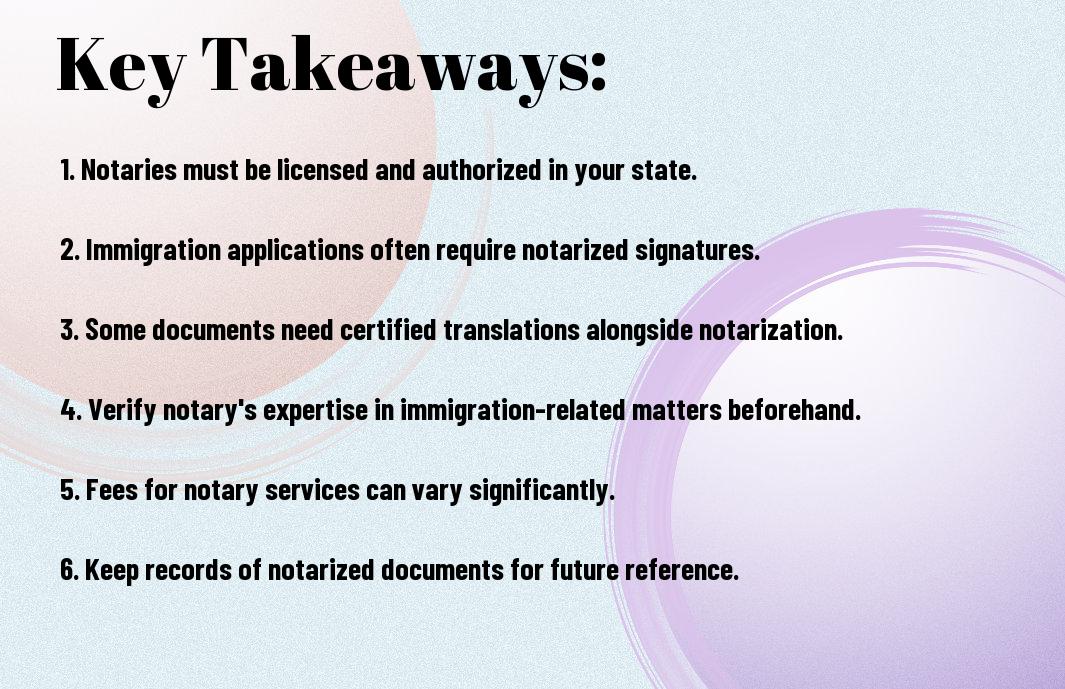With the complexities of immigration applications, understanding notary requirements is vital for ensuring the accuracy and validity of your documents. You may need to consider the role of notaries as they facilitate the proper execution of legal papers. Familiarize yourself with the specifics, including the difference between Notaries and Notarios Publicos, as they can vary in function. For more detailed information, check out this resource on Notaries, Notarios Publicos, and Immigration.
Key Takeaways:
- Identification: Applicants must provide valid identification to the notary to authenticate their identity. This is important for the validity of the documents.
- Signature Verification: Notaries are responsible for verifying the signatures on immigration documents to ensure they are completed properly before submission.
- Notary Public Limitations: It’s important to understand that notaries cannot provide legal advice or represent applicants in immigration proceedings.
- Document Types: Immigration applications may require various documents, such as affidavits and translations, which must be notarized correctly.
- State-Specific Rules: Notary requirements can vary by state; therefore, applicants should check local regulations to ensure compliance.
Overview of Notary Functions in Immigration
Your understanding of notary functions is vital when navigating the immigration process. Notaries play a significant role in verifying documents and facilitating the proper filing of immigration applications. They ensure that your paperwork is accurately completed and may help to prevent delays in your application due to errors. Knowing how notaries can assist you helps streamline your journey toward immigrant status.
Definition and Role of a Notary
Role of a notary includes acting as an impartial witness during the signing of documents. They verify the identity of individuals, administer oaths, and affirm the authenticity of signatures. In the context of immigration, notaries help ensure that your documents comply with legal standards, which can be vital for your application’s success.
Differences Between Notary Public and Immigration Attorney
Beside their functions, it’s important to distinguish between a notary public and an immigration attorney. While both can assist you, they serve different purposes. A notary public primarily verifies signatures and ensures that documents are executed correctly, whereas an immigration attorney provides legal advice, represents you in legal matters, and navigates the complexities of immigration law.
Definition of these differences highlights that immigration attorneys possess specialized training and are licensed to handle legal issues surrounding immigration matters. They can advocate for your case and offer personalized advice tailored to your specific situation. In contrast, notaries do not have the legal authority to provide such assistance, making the choice between the two significant based on your needs.
Notary Requirements for Immigration Applications
The notary process plays a significant role in immigration applications, ensuring that your documents are duly authenticated. Most immigration authorities require you to submit notarized documents to validate your identity and provide an additional layer of credibility to your application. By adhering to notarial requirements, you enhance your chances of a successful application and smooth processing.
General Notarial Practices
Any notary public will guide you on general practices that ensure your documents meet legal standards. This typically involves verifying your identity, witnessing your signature, and administering an oath if required. It’s important to choose a notary well-versed in immigration-related matters, as this ensures your documents will be correctly handled and accepted by immigration authorities.
Specific Documentation Guidelines
Applications for immigration often require specific documentation that must be notarized. You should consult with your notary about which documents need to be completed following notarial protocols, including forms such as affidavits, declarations, and other supporting materials central to your case.
Understanding the specific documentation guidelines is vital for a smooth immigration process. Make sure you gather all required forms and any additional documents as specified by the immigration authorities. Different types of applications may require different sets of documents, so being precise and organized will help you avoid delays and potential issues with your application. Always check that your documents are fully completed, signed, and, most importantly, notarized according to the stringent requirements set forth for your immigration application.
Common Immigration Applications Requiring Notary Services
Many immigration applications necessitate notary services to authenticate documents and ensure compliance with legal standards. These applications often include family reunification petitions, employment-based visas, and adjustment of status requests, all of which require meticulous documentation. Maintaining accurate and notarized documents is imperative to avoid potential delays and complications in your application process.
Family-Based Immigration
On your journey towards family-based immigration, proper documentation is vital. You may need to submit forms like the I-130 Petitions for Alien Relatives, which often require notarized signatures and copies to validate your claims. Ensuring that all documentation is correctly notarized can help expedite the processing of your application and bring your family closer together.
Employment-Based Immigration
Before submitting your employment-based immigration application, it’s important to prepare your supporting documents accurately. Notarization of crucial documents such as job offers and labor certification can bolster your case and reflect professionalism in your application packet.
Notary services play an imperative role in your employment-based immigration process. Notarizing documents like Form I-140 (Immigrant Petition for Alien Worker) ensures that all signatures and statements are legally valid. This step helps prevent potential issues with the U.S. Citizenship and Immigration Services (USCIS) that could arise from improperly signed documents. By employing notary services, you can enhance the credibility of your application and increase your chances of a favorable outcome.
Validating Notary Certificates
All immigration applications often require notarized documents, making it necessary to validate notary certificates accurately. A validated notary certificate verifies that the notary public has fulfilled their duties correctly and can help strengthen your application. This process minimizes the risk of setbacks and enhances the credibility of your submitted documents in the eyes of immigration authorities.
Importance of Proper Notary Acknowledgment
Any error in the notary acknowledgment can lead to complications and potential rejection of your application. A properly executed acknowledgment confirms the authenticity of your signature and the intent behind the documentation. Ensuring that the notary’s acknowledgment is complete and correctly filled out safeguards your application process.
Checking Notary Credentials and Authority
Validating the credentials and authority of your notary is necessary for a smooth immigration process. You need to ensure that the notary is licensed, has the proper jurisdiction, and is in good standing within their state. An unauthorized or improperly connected notary can jeopardize the validity of your documents, leading to unnecessary delays.
Notary public appointments can vary by state, so it’s important for you to confirm that your notary has the legal authority to notarize documents in your jurisdiction. You can verify their status through state licensing boards or government websites. Some states even provide databases where you can check the notary’s credentials and ascertain their active status. Taking these steps ensures that your notarized document is legitimate and helps you avoid complications with your immigration application.
Potential Consequences of Improper Notarization
Once again, ensuring proper notarization is vital for your immigration applications. Failing to adhere to notary requirements can lead to significant complications that may jeopardize your case. Any discrepancies or errors in notarization can raise red flags for immigration officials, potentially undermining the credibility of your documents and application.
Application Delays
On multiple occasions, improper notarization can result in unexpected application delays. If documentation is not adequately notarized, the reviewing immigration authority may require additional verification or even return your application for corrections, extending your waiting time unnecessarily.
Risks of Fraud and Legal Issues
Below, you should be aware that improper notarization poses serious risks of fraud and legal issues. Notarized documents are expected to be genuine and reliable; any evidence of tampering or forgery could lead to severe penalties, including possible removal proceedings.
Plus, the implications of such risks can extend beyond your current immigration application. If found guilty of submission of fraudulent documents, you may face legal consequences that could affect future attempts at immigration or even result in criminal charges. Upholding the integrity of your documents not only strengthens your application but also protects you from potential legal pitfalls.
Resources for Finding Notary Services
Despite the importance of finding reliable notary services for your immigration applications, it can often be overwhelming. Thankfully, several resources are available to aid you in your search. Local community centers may offer notary assistance or can connect you with qualified professionals. Additionally, online directories can help you identify notaries in your area. Be sure to consider reviews and recommendations when selecting a notary to ensure you receive the best service possible.
State Licensing Boards
Services provided by notaries can vary, so it’s beneficial to consult your state’s licensing board. Each state has regulations that notaries must adhere to, and you can typically find a list of licensed notaries on their official website. This ensures you select a notary who is compliant with state laws and procedures, ultimately providing peace of mind as you navigate your immigration application.
Professional Notary Associations
Below are valuable tools for finding notaries: professional associations often maintain directories that include certified notaries in your area. These organizations provide resources for both notaries and clients, helping you make informed choices as you pursue your immigration goals.
And these professional notary associations also offer additional services, such as training and certification programs for notaries, ensuring they stay updated on regulations and best practices. By choosing a notary affiliated with a reputable association, you can boost your confidence in their expertise and professionalism. This connection can lead to a more efficient and accurate completion of your immigration application.
To wrap up
Now that you understand the notary requirements for immigration applications, you can ensure that your documents are properly prepared and authenticated. It’s vital to verify that any notary you choose is licensed and familiar with the specific immigration documentation you need. Keeping your records organized can streamline the process and prevent delays in your application. By following these guidelines, you enhance your chances of a successful immigration journey.
FAQ
Q: What types of documents typically require notarization for immigration applications?
A: Immigration applications may require notarized documents such as affidavits, personal statements, or declarations that provide evidence supporting the applicant’s case. Additionally, documents that prove identity, relationship to family members, and any other supporting documents may also need to be notarized to ensure their authenticity and validity in the application process.
Q: Who is eligible to serve as a notary for immigration-related documents?
A: In the United States, a notary public must be officially appointed by the state, which includes passing a background check and completing any required training or education. Notaries can be lawyers, clerks, or individuals from various professions that have met their state’s requirements. However, it is important to ensure that the notary has experience with legal documents related to immigration, as they should understand the specific requirements and potential implications for the application being submitted.
Q: What should I consider when selecting a notary for my immigration documents?
A: When dicking out a notary for immigration documents, consider their experience with immigration cases, as they will be more familiar with the necessary documentation. It’s also wise to confirm their credentials and ensure they are licensed and in good standing within their state. Additionally, inquire about their processing times and fees to avoid any unexpected issues or delays in your application submission.


